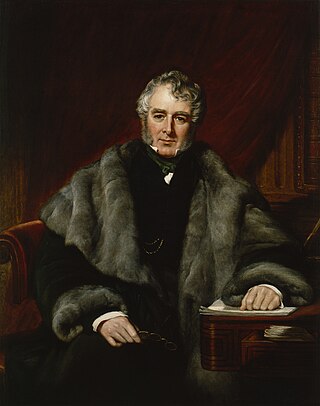
William Lamb, 2nd Viscount Melbourne, in some sources called Henry William Lamb, was a Whig politician who served as the Home Secretary and twice as the Prime Minister of the United Kingdom.
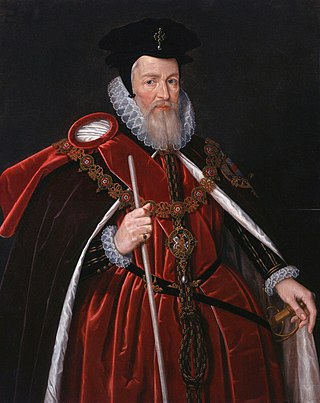
William Cecil, 1st Baron Burghley was an English statesman, the chief adviser of Queen Elizabeth I for most of her reign, twice Secretary of State and Lord High Treasurer from 1572. In his description in the Encyclopædia Britannica Eleventh Edition, A.F. Pollard wrote, "From 1558 for forty years the biography of Cecil is almost indistinguishable from that of Elizabeth and from the history of England."

Robert Cecil, 1st Earl of Salisbury, was an English statesman noted for his direction of the government during the Union of the Crowns, as Tudor England gave way to Stuart rule (1603). Lord Salisbury served as the Secretary of State of England (1596–1612) and Lord High Treasurer (1608–1612), succeeding his father as Queen Elizabeth I's Lord Privy Seal and remaining in power during the first nine years of King James I's reign until his own death.

Hatfield House is a Grade I listed country house set in a large park, the Great Park, on the eastern side of the town of Hatfield, Hertfordshire, England. The present Jacobean house, a leading example of the prodigy house, was built in 1611 by Robert Cecil, 1st Earl of Salisbury and Chief Minister to King James I. It is a prime example of Jacobean architecture. The estate includes extensive grounds and surviving parts of an earlier palace. The house is currently the home of Robert Gascoyne-Cecil, 7th Marquess of Salisbury. It is open to the public.

Elizabeth is a 1998 British biographical period drama film directed by Shekhar Kapur and written by Michael Hirst. It stars Cate Blanchett in the title role of Elizabeth I of England, with Geoffrey Rush, Christopher Eccleston, Joseph Fiennes, John Gielgud, and Richard Attenborough in supporting roles. The film is based on the early years of Elizabeth's reign, where she is elevated to the throne after the death of her half-sister Mary I, who had imprisoned her. As she establishes herself on the throne, she faces plots and threats to take her down.
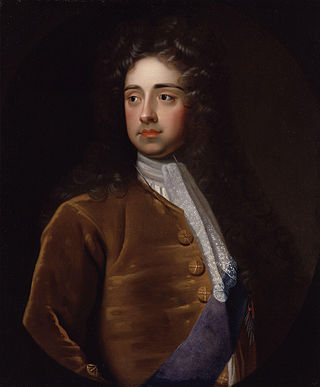
The Lord High Treasurer was an English government position and has been a British government position since the Acts of Union of 1707. A holder of the post would be the third-highest-ranked Great Officer of State in England, below the Lord High Steward and the Lord High Chancellor of Great Britain.
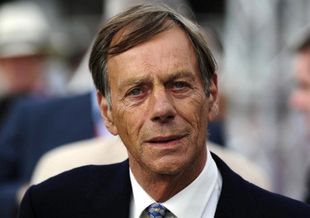
Sir Henry Richard Amherst Cecil was a British flat racing horse trainer. Cecil was very successful, becoming Champion Trainer ten times and training 25 domestic Classic winners. These comprised four winners of the Derby, eight winners of the Oaks, six winners of the 1,000 Guineas, three of the 2,000 Guineas and four winners of the St Leger Stakes. His 1000 Guineas and Oaks successes made him particularly renowned for his success with fillies. He was noted for his mastery at Royal Ascot, where he trained 75 winners.
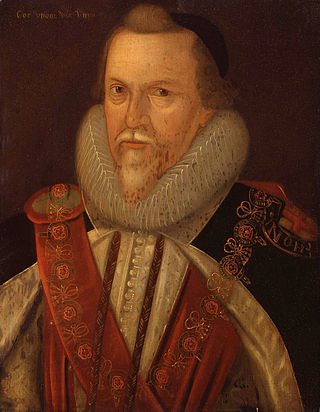
Thomas Cecil, 1st Earl of Exeter, KG, known as Lord Burghley from 1598 to 1605, was an English politician, courtier and soldier.
William Talbot, 1st Earl Talbot, PC, styled as Lord Talbot from 1737 to 1761, was an English peer and Whig politician. Talbot was a notable figure among opposition Whig politicians during the reign of King George II before later coming to Court during the reign of his grandson, taking the office of Lord Steward of the Household.

Violet Georgina Milner, Viscountess Milner was an English socialite of the Victorian and Edwardian eras and, later, editor of the political monthly National Review. Her father was close friends with Georges Clemenceau, she married the son of Prime Minister Salisbury, Lord Edward Cecil, and after his death, Alfred Milner, 1st Viscount Milner.
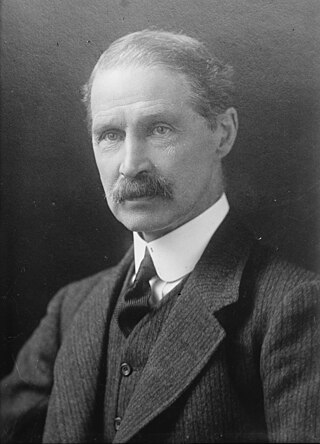
The Conservative Government of the United Kingdom that began in 1922 and ended in 1924 consisted of two ministries: the Law ministry and then the first Baldwin ministry.

Cecil Bisshopp Harmsworth, 1st Baron Harmsworth LLD, was a British businessman and Liberal politician. He served as Under-Secretary of State for the Home Department in 1915 and as Under-Secretary of State for Foreign Affairs between 1919 and 1922.

Elizabeth I is a two-part 2005 British-American historical drama television serial directed by Tom Hooper, written by Nigel Williams, and starring Helen Mirren as Elizabeth I of England. The drama covers approximately the last 24 years of her nearly 45-year reign. Part 1 focuses on the final years of her relationship with the Earl of Leicester, played by Jeremy Irons. Part 2 focuses on her subsequent relationship with the Earl of Essex, played by Hugh Dancy.

Margaret Thatcher was Prime Minister of the United Kingdom from 4 May 1979 to 28 November 1990, during which time she led a Conservative majority government. She was the first woman to hold that office. During her premiership, Thatcher moved to liberalise the British economy through deregulation, privatisation, and the promotion of entrepreneurialism.
John Boxall was an English churchman and secretary of state to Mary I of England.

In the Kingdom of England, the title of Secretary of State came into being near the end of the reign of Elizabeth I, the usual title before that having been King's Clerk, King's Secretary, or Principal Secretary.
In the history of the British monarchy, King James VI of Scotland communicated in secret with the administrators of Queen Elizabeth I of England between May 1601 and her death in March 1603. In this period it was settled that James would succeed Elizabeth, his distant relative, but this result was kept a secret in a small diplomatic community. James's accession to the thrones of England and Ireland is known as the Union of the Crowns. From 1586 onwards James also received money from Elizabeth, an annual subsidy, which forged closer links.
The 1896 Birthday Honours were appointments by Queen Victoria to various orders and honours to reward and highlight good works by citizens of the British Empire. The appointments were made to celebrate the official birthday of The Queen, and were published in The London Gazette on 20 May and 26 May and in The Times on 20 May 1896.
Barbara Ruthven was a Scottish courtier and favourite of Anne of Denmark, expelled from court after the death of her brother.














